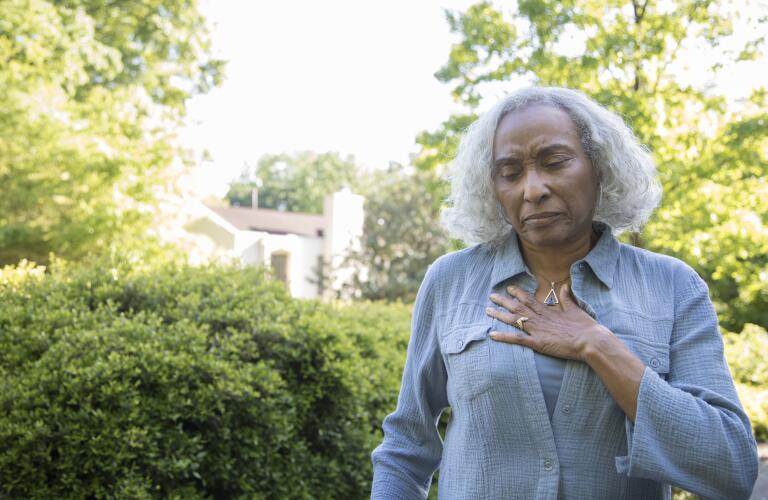Reasons Why Women Would Continue to Lose Iron After Age 58
— Written By Sarah Handzel, BSN, RN
Updated on July 2, 2021

Getty
Iron-deficiency anemia is among the most common medical problems worldwide. Anyone can develop it, but women of all ages are at especially high risk for this condition, which occurs when iron levels in the body are too low. Iron is an essential element used by red blood cells to help carry oxygen to body tissues. Without enough iron, you're more at risk for problems like shortness of breath or extreme fatigue.
In many cases, iron-deficiency anemia develops because of a lack of iron in your diet, but it can also be related to blood loss. Women are at higher risk because of factors like menstrual blood loss and giving birth. But even postmenopausal women can be affected by this condition, since, in many cases, it develops slowly over a long period of time. Although women need much less iron after menopause, if you suffer from gastrointestinal issues, avoid meat, or frequently donate blood, you could be at greater risk compared to others.
Fortunately, iron-deficiency anemia in postmenopausal women can usually be treated easily. If you experience any symptoms relating to anemia, talk with your doctor about testing to see whether this problem affects you. If your doctor makes a positive diagnosis, he or she can help you plan a treatment course that helps you feel better.
Anemia Symptoms and Causes
In its milder forms, iron-deficiency anemia may not cause noticeable symptoms; in these cases, the condition is often discovered accidentally during other routine blood tests. However, if you have a more moderate to severe form of the condition, you may experience anemia symptoms including brittle or misshapen nails, chest pain, rapid heartbeat, or shortness of breath, cold feet or hands, extreme fatigue or generalized weakness, headaches, especially after activity, pale skin, and even unusual cravings to eat items such as ice or dirt.
In postmenopausal women, iron-deficiency anemia most often results from some sort of gastrointestinal tract bleeding. This type of bleeding may occur as a result of many factors, including hemorrhoids, diseases like peptic ulcer disease, and certain types of cancers. Additionally, other conditions, such as celiac disease, ulcerative colitis, or Crohn's disease may also make iron-deficiency anemia more likely.
Diagnosing and Treating Iron-Deficiency Anemia in Women
Your doctor can diagnose iron-deficiency anemia with a simple blood test. If the results of your test indicate anemia, your doctor may recommend certain follow-up tests, like a colonoscopy or a fecal occult blood test, to check for bleeding in your GI tract or stool.
Your specific treatment plan depends on the severity of your condition and its underlying cause. In most cases, oral iron supplements are enough to boost your body's iron levels and manage any symptoms you have. However, more severe cases of anemia may require other treatments, such as intravenous (IV) iron supplementation, to quickly correct iron levels. And if your anemia is caused by GI tract bleeding, your doctor may recommend further therapy, like antibiotics or surgery.
Studies show postmenopausal women are less likely to benefit from oral iron supplements due to high rates of malabsorption. Malabsorbtion is the inability of the GI tract to absorb nutrients from the food you eat and supplements you take. Diseases like celiac disease, irritable bowel disease, and gastritis are known to cause malabsorbtion, so if they are the initial causes of iron-deficiency anemia, treating with oral tablets is likely not going to be as effective as other options like IV supplementation.
Changing your diet to include more iron-rich foods can also be beneficial for raising your body's iron levels. Good sources of iron include:
- Dark green leafy vegetables
- Dried beans and fruits
- Eggs
- Lean red meat
- Salmon
- Tofu
However, be sure to check with your doctor before making any major lifestyle changes. Too much iron can also cause problems, so it's best to improve iron levels under medical supervision.
Iron-deficiency anemia may cause many unpleasant symptoms, but, for most postmenopausal women, this condition is usually easy to correct. Be sure to let your doctor know about any symptoms you have, as well as any bleeding issues you may notice. With your doctor's help, you can correct this problem and keep your iron levels in check.
Source: https://www.healthgrades.com/right-care/womens-health/iron-deficiency-anemia-in-postmenopausal-women

0 Response to "Reasons Why Women Would Continue to Lose Iron After Age 58"
Post a Comment